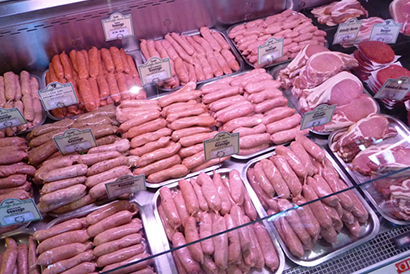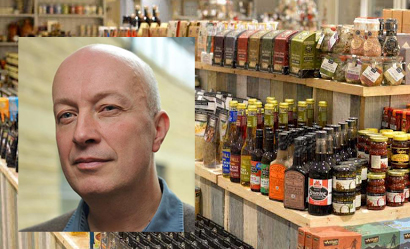A new University report charts the rise to prominence of local suppliers and farm shops who rose to the challenge unhindered by complex international supply chains and the vulnerabilities of just-in-time delivery systems.
LOCAL food producers and suppliers - such as farm shops - have risen to the challenge of the COVID-19 crisis, meeting a rapid rise in demand. And the change in attitudes among shoppers could last beyond the pandemic, according to a University of Huddersfield expert. Sourcing food locally could become the new normal.
"Given the circumstances, it's quite a positive story," said Dr John Lever, who researches food systems and supply chains in the University's Centre for Sustainability, Responsibility, Governance and Ethics.
"During lockdown the local food system came into its own and served the needs of local people and communities really well. The potential has been there for a long time, but the crisis showcased what the local food system can do."
Dr Lever has provided expertise to Huddersfield Sustainable Town, founded by local MP Barry Sheerman. Now, he has furnished the group with a COVID-19 Policy Brief, outlining a regional approach to food system reform, based on his University of Huddersfield-funded research.
Study Sustainability and Environmental Management at Huddersfield
The new document highlights the response of primary food producers and small food business during the early stages of the pandemic. They adapted quickly to a rapidly-changing situation, writes Dr Lever.
"As multiple food service outlets closed or locked down, local farmers, food producers, farm shops, independent retailers and home delivery services experienced a sudden and rapid increase in demand," he continues.
"Unhindered by complex international supply chains and the vulnerabilities of just-in-time delivery systems, the local food system across the region adapted quickly to address the needs of local people and communities. This in turn raised the question of how the benefits that emerged for the local food economy during this period can be maintained into the future."
Dr Lever - who is a Reader at the University of Huddersfield's Department of Management - has also written on farm shops and food system resilience in a time of crisis, in a blog for the Countryside and Community Research Institute based at the University of Gloucester.
He tells how farm shops in particular thrived during the COVID-19 lockdown, providing access to a wide variety of fresh produce from family-run farms across the region.
"All kinds of innovations soon appeared," writes Dr Lever. "Some farm shops simply converted their stores to accommodate social distancing, while others changed to delivery only. Some started delivery services across a wider geographical area, while others started delivery services for the elderly, vulnerable and those advised to self-isolate; another started delivering 'isolation boxes' and (as a new lockdown routine emerged) Sunday lunches using their own produce and locally-sourced chicken and turkey.
"Many farm shops also differentiated their offer, offering a wider variety of grocery products alongside their traditional range of dairy, meat and organic products. Others bagged up rice, pasta and flour, the latter being in particularly high demand from the Pakistani community. Demand in some shops tripled or quadrupled in a very short period."
More consumer choice
A number of interviewees told Dr Lever that farms shops are not as expensive as imagined and that local people often avoid them not because of price, but because supermarkets are easier to access on the way home from work for people leading busy lives.
"But as people consider their options in a post COVID-19 world, and employers allow their employees to work at home on a more regular basis, there are signs that sourcing local food will potentially become the new normal for many people," writes Dr Lever in his blog.
"While farm shops lack the capacity to serve entire populations, there is no doubt, as the crisis has shown, that they have a greater role to play enhancing the resilience of regional food systems."
- Dr John Lever - a member of the University of Huddersfield's Centre for Sustainability, Responsibility, Governance and Ethics - has also hosted a webinar on regional food system resilience during COVID-19. He presented his preliminary findings from on-going University of Huddersfield-funded research on the resilience of the Kirklees Food System, and there were also contributions from experts at the universities of Leeds and Gloucester.








